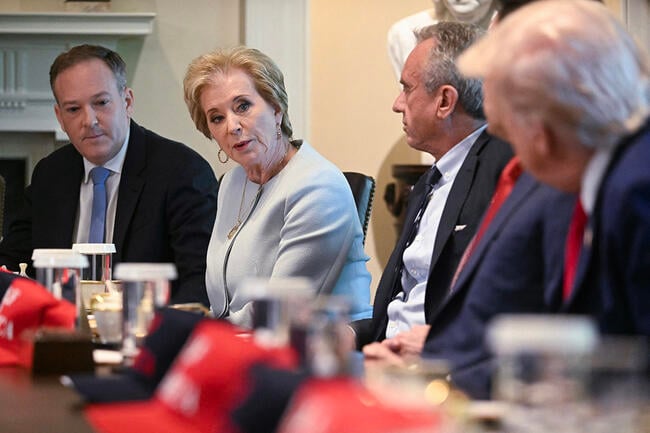You have /5 articles left.
Sign up for a free account or log in.

McMahon would have the authority to kick employers out of the Public Service Loan Forgiveness program under the proposed plan.
Jim Watson/AFP/Getty Images
The Education Department is planning to put new limits on which employers can qualify for the Public Service Loan Forgiveness program, according to a draft proposal obtained by an advocacy group.
Any employers who engage in what the department calls “activities that have a substantial illegal purpose” could be kicked out of the program, and any payments that borrowers make while working for them won’t count after their employers are no longer eligible, according to the draft document. PSLF requires that borrowers make 120 monthly payments while working for a qualifying employer in order to have their remaining balances wiped out.
The draft proposal is part of a lengthy process to amend the PSLF regulations that began this spring. Critics worry that the changes could derail debt relief for borrowers and allow the administration to block funds from reaching public servants who work in fields or for employers that the president disagrees with. Any new regulations could take effect July 1, 2026; the draft proposal doesn’t say whether the department would retroactively disqualify payments.
“The law does not empower the Secretary of Education to opine on the supposed illegality of a public service employer’s mission—an unprecedented exercise of executive power that extends far beyond the Higher Education Act,” said Mike Pierce, executive director of the Student Borrower Protection Center, which shared a copy of the issue paper with Inside Higher Ed.
The Education Department didn’t respond to questions about advisory committee members nor a request for comment about the document.
An advisory committee will review the proposal next week as part of the process known as negotiated rule making. The department hasn’t said who will serve on the committee, but the panel is set to meet from June 30 to July 2.
Pierce said in a statement that the Justice Department and courts should instead address concerns that an organization engaged in unlawful activities.
“Rather than serving as the nation’s top education official, Secretary McMahon’s proposal puts on full display her ambition to be a general in Trump’s culture war,” he said. “Students, borrowers, and our communities all deserve better than more thinly-veiled fascism.”
But the Trump administration claims the current PSLF rules misdirect “tax dollars into activist organizations that not only fail to serve the public interest, but actually harm our national security and American values, sometimes through criminal means,” according to a March executive order that directed the Education Department to change eligibility requirements for employers, leading to this week’s proposal.
Under the proposed changes, Education Secretary Linda McMahon would deem whether the preponderance of the evidence shows that an organization engaged in activities that have substantial illegal purposes, though the employer can respond to that determination.
The department considers such illegal activities to include:
- aiding or abetting violations of federal immigration laws
- supporting terrorism
- "engaging in the chemical and surgical castration or mutilation of children"
- engaging in a pattern of aiding and abetting illegal discrimination
“Illegal activities, including illegal immigration, human smuggling, child trafficking, pervasive damage to public property, and the disruption of the public order are a threat to our national security and to the social and economic stability of the United States,” the issue paper says. “The department has an overriding governmental interest in promoting policies to thwart such unlawful conduct.”
Borrowers can qualify for PSLF if they work in government, as civilians in the military or for a qualifying nonprofit. Since Congress created the program in 2007 as a way to incentivize Americans to work in public service, more than one million borrowers have had their loans forgiven, though much of that relief occurred during the Biden administration.
The advisory committee’s meetings are a key part of negotiated rule making. However, the department doesn’t have to accept the committee’s changes unless the panel unanimously agrees. After the committee wraps up its work, the department will then release proposed changes, take public comment on the regulations and review those comments before finalizing the rule.
PSLF is just one of several topics on the table during this round of negotiated rule making. The advisory committee will likely review the regulations related to income-driven repayment plans. The department also left the door open to consider “other topics that would streamline current federal student financial assistance programs.”
McMahon told lawmakers this month that through this round of rule making, the department is working to tackle the root cause of “soaring college costs.”
“We have begun a wholesale reform of higher education regulations through the negotiated rule making process to promote competition and innovation while ensuring institutions meet rigorous standards,” she said in her written testimony.




